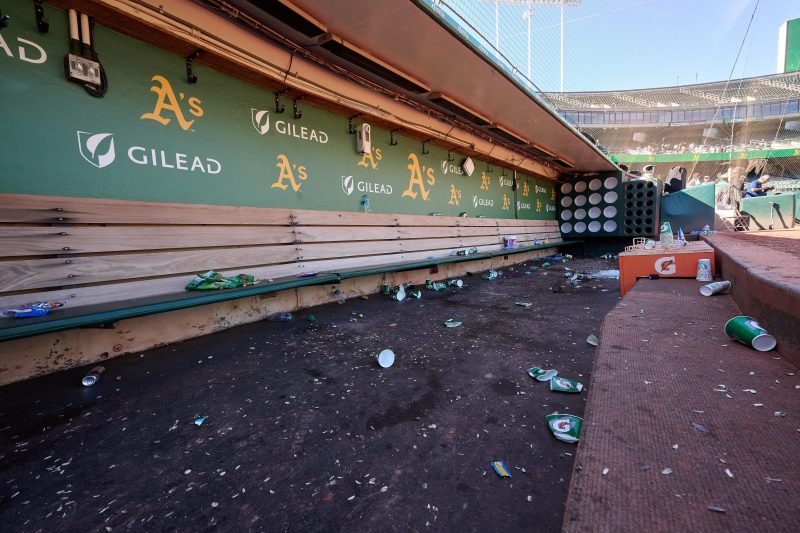
Are the Athletics moving to Vegas? MLB owners voting on relocation
Major League Baseball’s owners are getting set to vote on the relocation of a franchise, even as that club has no specific home for two seasons, faces potential legislative roadblocks to crucial public financing and a shotgun wedding-style timeline to construct a permanent home.
Ready for the Las Vegas Athletics?
Apparently, MLB’s owners are, as they’ve called for a vote approving the team’s relocation from Oakland to Nevada. Twenty-three of 30 owners are required to approve the move, with balloting on the agenda at the owners’ meetings beginning Nov. 14 in Arlington, Texas.
Votes are rarely called unless the group has significant confidence it will pass. Yet there’s not much about the A’s move that appears shovel-ready.
A look at the whys and what-abouts regarding Oakland’s move ahead of the vote:
FOLLOW THE MONEY: MLB player salaries and payrolls for every major league team
Why are the A’s moving?
Owner John Fisher grew tired of attempting to secure funding for a new stadium in Oakland, abruptly cutting off negotiations with the city and announcing his intention to move the club to Las Vegas, where a $1.5 billion, retractable-roof stadium theoretically awaits. While the stadium search has dragged on nearly two decades in Oakland and other Bay Area cities, the A’s would be moving to the 40th-largest media market in the country, away from the No. 6 market they share with the Giants, across the Bay Bridge in San Francisco.
How are they financing the move?
The A’s received $380 million in financing from the state of Nevada after their lobbyists and tourism interests in Las Vegas convinced legislators to approve SB1, which was voted on in a special session Gov. Joe Lombardo called in June.
Fisher plans to finance the remaining $1.1 billion through a combination of debt and equity, the latter involving a small piece of ownership changing hands. The club says it has partnered with Goldman Sachs in hopes of financing the debt, which will be paid off with interest.
The A’s have insisted the new ballpark will generate revenue certainty enabling them to retain ballplayers rather than trade them away or let them leave via free agency, as they have with almost every key player in the last 30 or so years in Oakland. Yet the financing obligation begs the question of how much better off the club will be going forward.
What about Nevada teachers’ opposition to public funding?
A group of Nevada teachers, Schools Over Stadiums, has been gathering support and prepared to gather signatures for a ballot referendum forcing a public vote, rather than legislative approval, for the $380 million in public money for the A’s stadium. MLB commissioner Rob Manfred has noted that the effort could be an obstacle in relocation.
But the schools group was dealt a setback Nov. 6 when a Nevada judge threw out the proposed ballot referendum and ordered them to re-file it, noting that language in their proposed bill was too broad. While the ballot referendum isn’t dead, it has hit a significant roadblock.
Where would the A’s play while the stadium is constructed?
Your guess is possibly as good as Manfred’s.
The A’s lease with Oakland expires after the 2024 season, and their stadium in Las Vegas would not be ready until at least the start of the 2028 season. That leaves two gap years, in which the A’s could play in their own Class AAA park in suburban Las Vegas, in Reno at the home of the Arizona Diamondbacks’ Class AAA club – or return, hat in hand, for two more seasons in Oakland.
Whether their old city would pridefully decline to house them for two more years or take another two seasons of rent payments remains an open question. Meanwhile, stifling heat in southern Nevada raises questions from both MLB and the MLB Players’ Association that their minor-league park in Summerlin would be insufficient.
Either way, the deadlines for both temporary and permanent sites are bearing down. The parent company of the Tropicana Resort that will be demolished for the A’s stadium site has set a Dec. 1 deadline for MLB owners to approve the move before they move toward demolition plans.
Hence, the vote on the owners’ meeting agenda, even as significant details remain unresolved.
Is Oakland resigned to losing its team?
Both fans and elected officials are aiming to keep the city in the conversation, beyond what we saw during the so-called “Summer of Sell” in Oakland and across the majors. Oakland’s City Council passed a resolution “reaffirming the Town’s commitment to the Oakland A’s,” with vocal fans filling council chambers.
Oakland mayor Sheng Thao says the city’s work in securing the Howard Terminal site for the A’s has put them in position to mobilize for a new stadium, with Oakland supporters theorizing Fisher walked away from negotiations when declining Gap stock made funding his $12 billion stadium-anchored real estate development unrealistic.
A 10-minute video breaking down the A’s plight has been sent to MLB and the 29 owners, not unlike Thao’s report she sent to the same stakeholders showing how Oakland was ready to move on a deal before Fisher pivoted to Las Vegas.
It all might be too little, too late for the A’s in Oakland, especially once owners give their expected approval. At worst, though, it puts Oakland front of mind among owners as a desirable expansion market – even if it loses the A’s.
